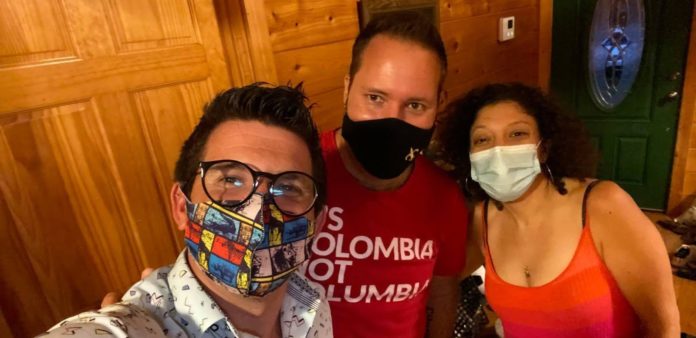
TACOMA, Washington — Global migration is a complex issue. Refugees seek asylum in the United States because they face horrific conditions in their home countries. However, they can also experience harrowing ordeals while as they undergo the U.S. immigration process. Lara Nochomovitz is an immigration lawyer in Louisiana with a large client base of asylum seekers. She has successfully earned her clients’ release from detention centers and helped them win asylum.
The Borgen Project spoke with Nochomovitz about why people seek asylum in the U.S. and what obstacles they may face as they go through the immigration process. Furthermore, Nochomovitz discussed the need for local and international aid to combat the human rights violations many asylum seekers face.
Why US Asylum Seekers Leave their Home Countries
Nochomovitz noted the variety of situations she’s encountered through her work. She’s met asylum seekers from Cameroon fleeing civil war and violence, asylum seekers from Cuba and Venezuala fleeing repressive political regimes, Black male asylum seekers from Mauritania fleeing extreme racism and gay asylum seekers from Central America fleeing LGBTQ intolerance. “There’s no limit to the people I’ve encountered. What motivates people to come here and seek asylum is often [that]they truly fear for their lives,” said Nochomovitz.
The Borgen Project also spoke with two of Lara Nochomovitz’s clients, Yariel Valdés González and Emmanuel Sali, who wished to use a pseudonym. González is a Cuban independent journalist who won asylum. He nevertheless was detained for an additional five months while the U.S. government appealed the case. He now reports about refugee and LGBTQ issues for The Washington Blade. “They [the Cuban government]don’t allow freedom of the press, freedom of expression,” explained González. “They made my life miserable. My colleagues and family were in danger. [In spite of this,] I refused to stop working because that is my role.”
Emmanuel Sali is a Cameroonian law student who fled Cameroon because of the ongoing war. Although he lost his asylum case, Sali earned release with Nochomovitz’s support and is now living in Colorado with his family while he progresses through the federal appeals process. Sali was attending law school when his father, a political activist, disappeared. The Cameroonian government accused him of knowing the whereabouts of his father and tortured him. He escaped to Nigeria, Ecuador and Mexico before spending two years in U.S. detention centers. “I spent eight months in jail before I could have my first hearing. I kept asking for parole and I got nothing. Nothing,” said Sali.
US Asylum Seekers: Individuals, Not Stereotypes
Lara Nochomovitz emphasized that U.S. asylum seekers include educated professionals and are not necessarily the stereotype of poor and helpless refugees. “Many of my clients were lawyers in their home countries, and they are not just my clients. The people I’ve helped are my friends. They are very capable,” said Nochomovitz.
Amnesty International, a global nonprofit organization that supports refugees worldwide, including U.S. asylum seekers, shares Nochomovitz’s point about refugee identity and specifically promotes the individuality of refugees. As the nonprofit declares on its website, “’Refugee,’ ‘migrant’ and ‘asylum-seeker’ are only temporary terms; they do not reflect the whole identity of women, children and men who have left their homes behind to start a new life in a new country.”
Long Detainment, Poor Conditions
Amnesty International also challenges long detentions and poor treatment in detention centers. In the U.S., it advocates freeing all detainees within 100 days. González emphasized that the Bossier Detention Center in Louisiana was “a real prison; not an immigration camp.” Moreover, Sali sustained injuries from harsh treatment from guards and contracted COVID-19 in the Winn Detention Center in Louisiana.
Nochomovitz highlighted the irony that people come to the United States with the expectation that it honors civil rights. Even now, the government can detain people and treat them poorly. “They come and they are thrown in jail for a long time,” said Nochomovitz. In 2019, Nochomovitz received texts from several detainees in one Lousiana detention center where guards pepper-sprayed, tear-gassed and beat detainees who would not disperse during a hunger strike protesting their long detainment.
Louisiana: Detention Hub with an Attorney Shortage
Louisiana is a hub for detainment centers because a few years ago, the state passed criminal justice reform that reduced the number of drug offenders and other non-violent criminals in state prisons and local jails. As a result, some of these locations transitioned to become detainment centers.
Since several of these centers are in remote locations, fewer attorneys venture there to support asylum seekers, Nochomovitz explained. Further, because the number of detainees in Louisiana recently doubled, there is a shortage of immigration lawyers like Nochomovitz to support U.S. asylum seekers there. According to González and Sali, Nochomovitz’s large following stems from her willingness to continually meet in person with detainees.
Nochomovitz also concentrates on post-release services such as securing temporary housing, making travel arrangements and completing work permit applications. Activist groups like Freedom for Immigrants and Louisiana Advocates for Immigrants in Detention also focus on detention visitation and legal support.
US Support in Asylum Seekers’ Home Countries
In terms of support of human rights in asylum seekers’ home countries, Lara Nochomovitz and González separately said that U.S. policy can backfire. Lara Nochomovitz used the example of U.S. military aid to Nicaragua in the 1980s. In the country, “[a]war [has been]going on that has been largely facilitated by weapons and dictators we helped put in place decades ago.” González mentioned that the U.S. embargo of Cuba is not working “because the Cuban people are the main people who are suffering[;] because of [the embargo], they don’t have food money.”
However, González said the U.S. provides important humanitarian aid to Cuba, including explicit support for independent journalists. United States Aid for International Development (USAID) Cuba has trained hundreds of independent Cuban journalists to bring awareness of human rights abuses in Cuba. These journalists have seen their work published throughout the world.
Asylum Seekers Need Champions
Because global migration is complex, U.S. asylum seekers need multiple advocates in their home countries and in the United States. Amnesty International and USAID work globally while Freedom for Immigrants and other groups spearhead support in the United States. And, according to both Sali and González, Nochomovitz is a champion of U.S. asylum seekers in Louisiana.
“Lara is like an angel. She helps so many people, a lot of immigrants. I talk with my editor and we say like she is a saint,” said González. Sali also noted, “In Lara, I saw this light, I saw this hope and saw what an American should be like.”
– Shelly Saltzman
Photo Credit: With Permission from Lara Nochomovitz







